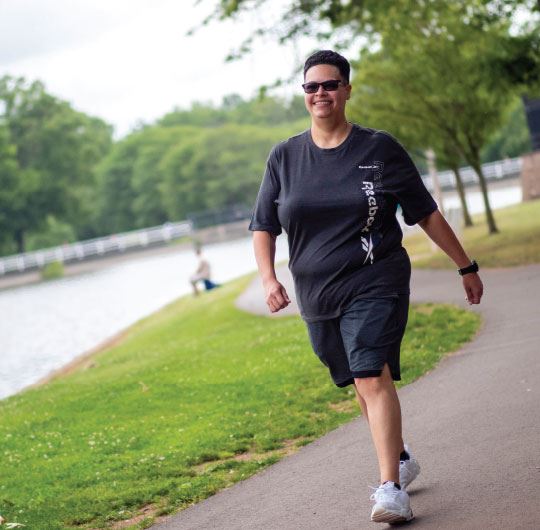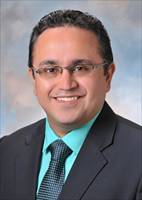“I tried to lose weight many times, but nothing worked. If I lost five pounds, I gained back 10 or 15."

Marilyn Gonzalez, 42, always knew her long hours as a security officer were contributing to her obesity. Then, one weekend in 2019, her company asked her to take on even more hours because of the untimely death of a coworker.
“I lost a friend at my job to a heart attack, and our lifestyles were similar; we worked and worked,” the Perth Amboy resident says. “I was almost 400 pounds and I never went to the doctor.”
Marilyn’s health issues included high blood pressure, sleep apnea and high blood sugar levels. “I was always in pain,” she says, in part because of enlarged breasts that put strain on her back and shoulders. “I tried to lose weight many times, but nothing worked. If I lost five pounds, I gained back 10 or 15.”
Her friend’s death inspired her to see her primary care physician, who suggested she look into having weight loss (bariatric) surgery.

After intensive online research, Marilyn decided to meet with Anish Nihalani, MD, Medical Director of the Surgical Weight Loss Program at Robert Wood Johnson University Hospital (RWJUH) Rahway. She liked him and his staff right away. “They were always welcoming, and they took the time to answer all my questions,” she says.
In order to be a candidate for bariatric surgery, a person must have a body mass index (BMI) of 40 or above or be more than 100 pounds overweight, or have a BMI of 35 or above and have one or more obesity-related disorders. Marilyn met the criteria. Dr. Nihalani said she was a candidate for the form of bariatric surgery known as a sleeve gastrectomy, in which most of the stomach is removed.
New Ways to Eat
Before she could have the surgery, though, Marilyn would have to lose 30 pounds, Dr. Nihalani said. “I told him it was impossible,” Marilyn says.
However, the Surgical Weight Loss Program’s comprehensive approach includes lifestyle changes to support sustainable weight management. Before surgery, patients are required to see a dietitian for three to six visits.
“They have to learn to make protein a priority because it helps with wound healing, and to maintain their lean body muscle as they begin to lose weight,” explains Surgical Weight Loss Program Coordinator Dianne Errichetti, RN, MSN, CBN. “Protein shakes are an efficient way to get the adequate protein needed before and after surgery.”
With a dietitian’s guidance, Marilyn was in fact able to lose 30 pounds presurgery. Her 70-hour weeks and long shifts had led her to eat a lot of fast food and big meals. Now she ate meals every three hours and drank protein shakes. She changed the kind of food she was eating, which had previously included a lot of processed foods and refined carbohydrates.
“Losing weight prior to surgery serves multiple purposes,” explains Dr. Nihalani. “It will lower the risk of complications and make it a safer surgery. Also, since surgery is only a tool for long-term weight loss and management, it reinforces to the patient that they must be an active participant in their health and well-being.”
Set for Success
“Marilyn had a great attitude and set herself up for success,” says Errichetti. “She showed up for all her appointments, got her primary care physician involved, followed her dietitian’s advice, took her vitamins as prescribed and got activity in each week.”
Marilyn also changed her work schedule so that she now works 52 hours a week instead of 70, leaving her more energy for exercise and other activities during her off time. “Marilyn put her health first despite life’s obstacles,” says Errichetti.
“My spouse has been the biggest support system,” Marilyn says. “I made the decisions myself, but I really thank her for all she did to help us change what we ate and how we ate, and to be with me through all of this.”
The Surgical Weight Loss Program offers monthly support group meetings, which include professionals and peers who have gone through the process. “We address mindful eating, good habits, stress management and the importance of exercise and movement,” says Errichetti. “The group provides patients with a sense of community.”
Marilyn has become an advocate and support person for those who want to be proactive in their own health. She wants to see other people who are struggling with weight begin to take care of themselves as she did.
“Start with small changes,” she advises. “Take a walk. Change something about the way you eat. Park farther from the supermarket because little changes go a long way."
“Weight loss is not about the surgery,” she concludes. “Surgery gives you a fresh start, but it’s part of an opportunity to change your life.”
What Is a Sleeve Gastrectomy?
- In a sleeve gastrectomy, approximately 80 percent of the stomach is removed. The remaining stomach is the size and shape of a banana.
- The smaller stomach holds less food and liquid, reducing the amount of food that is consumed.
- The surgery also removes the portion of the stomach that produces most of the “hunger hormone.”
- It is a simple and safe surgery, but is nonreversible.
Source: American Society of Metabolic and Bariatric Surgeons
To learn more about weight loss surgery at RWJUH Rahway, call 732-499-6300.